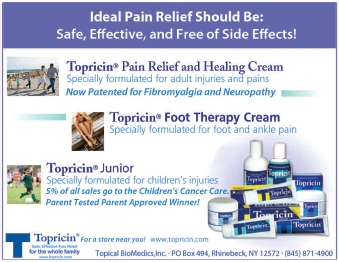Editor’s Note: This article is intended for information purposes only. Because state and municipal laws vary greatly, as do the circumstances of individual cases, readers are advised to contact an attorney for specific legal advice. © Scott C. Tips 2011
Everyone with even an ounce of common sense has grave concerns about the U.S. Food and Drug Administration (FDA)’s “Draft Guidance for Industry: Dietary Supplements: New Dietary Ingredient Notifications and Related Issues,” which was released last July. This Agency sprang this trap on both industry and consumers without seeking any prior input from us at all. It had almost 17 years to seek our opinion before coming out with this document, and then decided to give us a miserly 90 days to respond with our comments, which period was just extended by an additional two months. Why should we be concerned about this document?
The Erosion of Our Health Rights
When the Dietary Supplement Health and Education Act of 1994 (DSHEA) was passed, contrary to what the mainstream media falsely reports, the law did not remove dietary supplements from the regulatory oversight of the FDA. What it did do is to remove the FDA’s arbitrary powers of life and death over supplements so that they could be treated more like foods rather than as drugs. The innovative tidal wave that was unleashed as a result of this breakout from regulatory prison resulted in some 1,000 new products a year in this market. What an incredible difference DSHEA made, and we all benefitted from the prison break. Oh, wait, the FDA’s drug-industry bosom-buddies did not benefit. And that is something they have never forgotten and have been fuming over ever since.
Not without their cohorts in U.S. Congress, the drug industry’s lobbyists have been pushing for years to hamstring DSHEA and its freedoms. For more than a decade, they have failed. But for the last several years, they have succeeded with sausage-slicing tactics that have gradually eroded DSHEA. First, there was the Dietary Supplement and Nonprescription Drug Consumer Protection Act of 2007 requiring adverse event reporting, along with the Final Rule issued by the FDA that same year which mandated near-drug-like Good Manufacturing Practices, and after that came the so-called FDA “Food Safety” Modernization Act (Sec. 113 particularly)—each one ratcheting up the pressure on supplements, the ultimate effect of which will be to drive out the smaller supplement manufacturers who cannot keep up with the increasing regulatory costs demanded of them by these laws and regulations that were touted as making already-safe supplements “safe.” The net effect will be to  gradually eliminate individual supplements. Were these laws ever truly designed to protect consumers? No, these laws had only one purpose in mind: To make supplements more expensive, less available, and to drive the consumer back into the filthy arms of the drug pushers.
gradually eliminate individual supplements. Were these laws ever truly designed to protect consumers? No, these laws had only one purpose in mind: To make supplements more expensive, less available, and to drive the consumer back into the filthy arms of the drug pushers.
This latest draft Guidance is straight out of the warped minds of the FDA’s anti-supplement, pro-drug industry mill. They could care less about good health, certainly care less about you or me. This has been proven so many, countless times over the decades of the Agency’s existence that there can no longer be even a shred of doubt. The revolving door between the drug industry and the FDA is a never-stopping one. Just witness its recent hiring of Johnson & Johnson’s executive Stephen Spielberg who was tapped by FDA Commissioner Margaret Hamburg, as the latest deputy commissioner within the Office of the Commissioner to oversee the Agency’s drug and device centers. This is not an exception, this is the rule.
The Compromise
Unfortunately, when DSHEA was passed, a compromise was reached in order to get unanimous passage. The parties agreed that all dietary supplements not marketed as of the date of DSHEA’s passage (October 15, 1994) would be “new dietary ingredients” (NDIs) for which notification would be sent to the FDA. At the time, some did not think much was wrong with this compromise. After all, hadn’t most supplements already been discovered? But, now, almost 17 years later, the health-food market is awash with these new dietary ingredients, such as resveratrol, ubiquinol, GABA, curcumin and bioperine. Notifications to the FDA have been made for many; but what is to happen to them now, with the FDA changing the law, all on its own?
Fantasy Land
This draft Guidance is a step into fantasy land. One night the FDA went to sleep and had a wonderful dream, a dream about a land where bureaucrats reigned supreme and the common citizen answered to every edict that flowed from the lovely bureaucrats’ mouths. If the bureaucrat said jump, then the citizen would jump; if the bureaucrat said roll over, then the citizen would roll over. It was a wonderful place, this bureau-paradise. But then the FDA woke up, and the non-dream reality was not nearly that perfect, yet the urge to make it bureau-perfect remained. Hence, these constant bureaucratic attempts to whittle down our freedoms until we can only jump to the tune of some unknown functionary sitting in some unknown office thinking that he or she knows what is better for us than we ourselves do.
This draft Guidance is just such an attempt. It turns the law on its head by changing a very basic notification system into an approval system subject to the arbitrary whims of the FDA. It requires very safe NDIs to go through unnecessary, expensive tests so that they can meet drug-like safety requirements. In essence, this Guidance ignores the incredible, proven safety record of supplements, both new and old. The FDA can produce no dead bodies whatsoever coming from the use of these new dietary ingredients.
Yet the FDA, ignoring the many tens of thousands of actual dead bodies coming from its expensive drug-approval regulatory regime, wants to imprint that badly flawed drug-approval regime upon the dietary-supplement market. In doing so, it ignores the clear intent of Congress when passing DSHEA that “the Federal Government should not take any actions to impose unreasonable regulatory barriers limiting or slowing the flow of safe products and accurate information to consumers” and that “the right of access of consumers to safe dietary supplements is necessary in order to promote wellness.”
Flood Them with Letters
The Guidance document is not law, but it is a clear expression of how the FDA intends to enforce its interpretation of the law. This interpretation is badly flawed. And its implementation will result in unnecessary high costs, arbitrary discrimination against small- and medium-sized businesses that will put thousands of people out of work by destroying jobs in a time of economic decline, and the loss of many useful and healthful supplements.
The FDA must withdraw this Guidance document at once, consult with industry and consumers on a longer-term basis than this paltry 150-day period, and come out with a new Guidance that better reflects the realities of the marketplace and the safe track record of supplements, including those with NDIs. The proposed requirements demanded by the FDA’s draft Guidance are unauthorized under Law, contradict Congress’ stated intent when it passed DSHEA, and will guarantee a backlash of legislative action the likes of which have not been seen in this legislative arena since 1994.
Readers may submit their comments to the FDA until Friday, December 2, 2011, by mailing, faxing, or writing on-line to the following contact addresses or numbers: (1) By mail to the Division of Dockets Management; Food and Drug Administration; 5630 Fishers Lane, Rm. 1061; Rockville, MD 20852; (2) By fax to (301)436-2639; and (3) By on-line submission at www.regulations.gov/#!submitComment;D=FDA-2011-D-0376-0001 (you may use the NHF as your organization name). By whichever means you comment, reference FDA Docket No. 2011-D-0376-001. Be firm, but polite.
The Legislative Approach
The National Health Federation, a non-profit health-freedom advocacy group opposing this Guidance document (www.thenhf.com), has already undertaken to introduce legislation that would: (1) Move the cut-off date for NDIs forward to a new date 15 years after October 15, 1994; and (2) Force the FDA to withdraw its current proposed draft Guidance for NDIs and replace it with one conforming to DSHEA. Replacing the current 1994 date with a new date of 2009 would act as a politically practical, albeit admittedly temporary, means of sheltering those numerous NDIs that represent absolutely no risk to our health and safety yet would be shunted into a regulatory graveyard were the current 1994 date and  Guidance document to remain in place.
Guidance document to remain in place.
H.L. Mencken once wrote, “For every complex problem there is a solution that is simple, neat, and wrong.” New dietary ingredients are not even a simple problem, let alone a complex one, yet the FDA has proposed a solution for them that is wrong. Your help is needed to awaken the FDA from dreamland. WF
A graduate of the University of California at Berkeley Law School, Scott C. Tips currently practices internationally, emphasizing Food-and-Drug law, business law and business litigation, trade practice, and international corporate formation and management. He has been involved in the nutrition field for more than three decades and may be reached at (415) 244-1813 or by e-mail at scott@rivieramail.com.
Published in WholeFoods Magazine, October 2011










